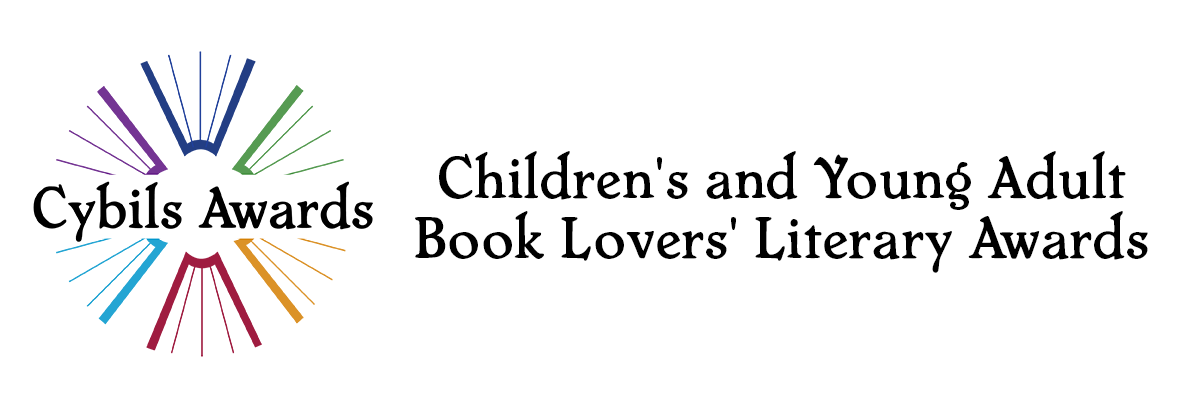Don Graves, father of the modern writing process, used to always say, “Poets are a lot like scientists. They both observe the world very, very closely.” Each of the books celebrates the merge of poetry with nonfiction. Perfect for science or social studies, as mentor texts for quick reports, or just plain old enjoyable reads for those of us who like a few facts with our poetry! Almost all of these poets have other poetry/nonfiction collections, so be sure to check out their other works.
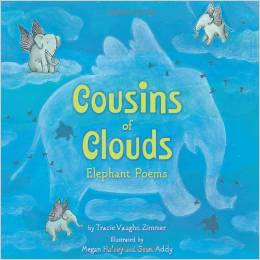 Cousins of Clouds by Tracy Vaughn Zimmer (2011 finalist): Twenty poems about all things elephant- elephant body parts, elephant customs, elephant habits. Each poem is accompanied by a fact (or two or three).
Cousins of Clouds by Tracy Vaughn Zimmer (2011 finalist): Twenty poems about all things elephant- elephant body parts, elephant customs, elephant habits. Each poem is accompanied by a fact (or two or three).
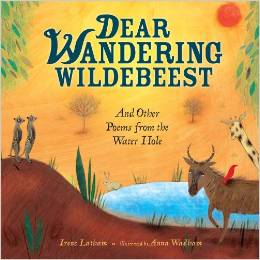 Dear Wandering Wildebeest by Irene Latham (2014 finalist): Poems like “Oxpecker Cleaning Service,” “Lifestyles of the Sleek and Sinuous,” and “Dung Beetles at Work,” and “What Rhino Knows,” as well as fabulous folkart-ish illustrations by Anna Wadham, make this visit to an African waterhole a huge hit.
Dear Wandering Wildebeest by Irene Latham (2014 finalist): Poems like “Oxpecker Cleaning Service,” “Lifestyles of the Sleek and Sinuous,” and “Dung Beetles at Work,” and “What Rhino Knows,” as well as fabulous folkart-ish illustrations by Anna Wadham, make this visit to an African waterhole a huge hit.
 Water Can Be, by Laura Purdie Salas (2014 nominee): Delightful science poems simple enough for the youngest poetry lovers, yet complex enough that upper intermediate readers will also love them. Don’t miss two others in this series, A LEAF CAN BE and A ROCK CAN BE.
Water Can Be, by Laura Purdie Salas (2014 nominee): Delightful science poems simple enough for the youngest poetry lovers, yet complex enough that upper intermediate readers will also love them. Don’t miss two others in this series, A LEAF CAN BE and A ROCK CAN BE.
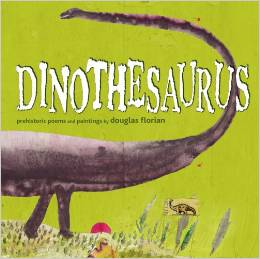 Dinothesarus by Douglas Florian (2009 nominee): Florian is a master, not only at playing with language, but also at embedding factual information into his poetry. DINOTHESAURUS is my personal favorite, but he has many others that are equally terrific!
Dinothesarus by Douglas Florian (2009 nominee): Florian is a master, not only at playing with language, but also at embedding factual information into his poetry. DINOTHESAURUS is my personal favorite, but he has many others that are equally terrific!
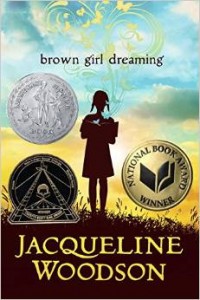 Brown Girl Dreaming, by Jacqueline Woodson (2014 finalist): Woodson’s memoir about coming of age during the Civil Rights movement won both the National Book Award and a Newbery Honor.
Brown Girl Dreaming, by Jacqueline Woodson (2014 finalist): Woodson’s memoir about coming of age during the Civil Rights movement won both the National Book Award and a Newbery Honor.
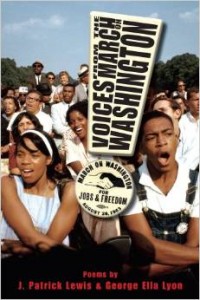 Voices from the March on Washington by J. Patrick Lewis and George Ella Lyon (2014 winner): J. Patrick Lewis and George Ella Lyon speak through the voices of participants to bring the August 1963 March on Washington. A must read for any one who has any interest in the Civil Rights Movement or teaches American History.
Voices from the March on Washington by J. Patrick Lewis and George Ella Lyon (2014 winner): J. Patrick Lewis and George Ella Lyon speak through the voices of participants to bring the August 1963 March on Washington. A must read for any one who has any interest in the Civil Rights Movement or teaches American History.
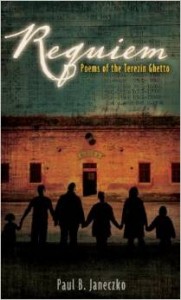 Requiem: Poems from the Terezin Ghetto by Paul B. Janezcko (2011 winner): REQUIEM takes readers inside Terezin, a Czechoslovokian concentration camp where many Jewish artists and musicians were imprisoned during World War II. Each poem is told from a different prisoner’s point of view. Illustrated with drawings from Terezin. Haunting.
Requiem: Poems from the Terezin Ghetto by Paul B. Janezcko (2011 winner): REQUIEM takes readers inside Terezin, a Czechoslovokian concentration camp where many Jewish artists and musicians were imprisoned during World War II. Each poem is told from a different prisoner’s point of view. Illustrated with drawings from Terezin. Haunting.
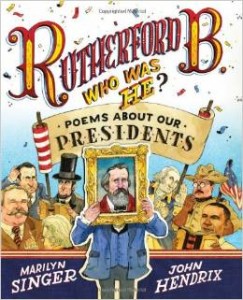 Rutherford B., Who Was He? by Marilyn Singer (2014 nominee): A rollicking romp through 43 presidents, complete with all their faults and foibles. Some presidents have individual poems, while others are grouped together. And John Hendrix’s illustrations do their own bit of teaching!
Rutherford B., Who Was He? by Marilyn Singer (2014 nominee): A rollicking romp through 43 presidents, complete with all their faults and foibles. Some presidents have individual poems, while others are grouped together. And John Hendrix’s illustrations do their own bit of teaching!
— Carol Wilcox, Carol’s Corner
